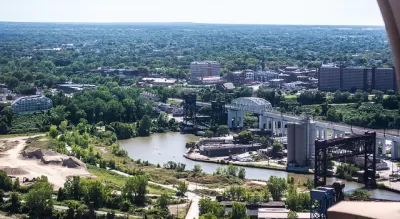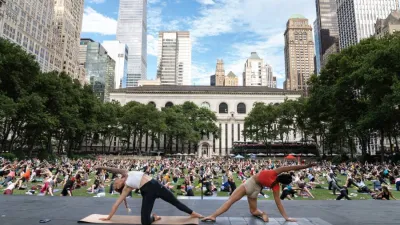The question of how the pandemic and all of its corresponding crises will alter the future of cities and planning has persisted since March. This article rightfully focuses those large, challenging questions of the Legacy Cities of the United States.

Jason Segedy writes about the future of Legacy Cities in the Post-Covid world, generating ideas based on information gathered during 15 hours of interviews with practitioners working on-the-ground in municipal government and community development in ten cities located in the Great Lakes region.
"There has been a lot of speculation about what the events of the past six months will mean for American cities in the future," writes Segedy to introduce the article. "Although most of the legacy cities of the Great Lakes region have been spared some of the most dramatic social and economic disruptions that have roiled their bigger coastal counterparts, their future, too, is unclear, particularly in the longer-term."
From the interviews, Segedy identifies three themes and eschews the notion of a one-size-fits all answer to the question of what will happen to Legacy Cities as a result of the pandemic. The themes, with a lot more detail provided in the source article, read as follows: 1) moving beyond the "eds and meds" economy, 2) the enduring importance of place, and 3) the advantages and disadvantages of smaller scale.
For an example of the kind of analysis that Segedy provides for each of these themes, the article includes a discussion of the pre-existing concerns about the "eds and meds" economic development model (as also documented in Alan Mallach's book The Divided City), before noting the struggles that both universities and healthcare institutions have encountered during the pandemic, and the likelihood that both sectors will face significant disruption over the next decade.
FULL STORY: Legacy Cities in a Post-COVID World: View From Experts in the Field

Alabama: Trump Terminates Settlements for Black Communities Harmed By Raw Sewage
Trump deemed the landmark civil rights agreement “illegal DEI and environmental justice policy.”

Planetizen Federal Action Tracker
A weekly monitor of how Trump’s orders and actions are impacting planners and planning in America.

The 120 Year Old Tiny Home Villages That Sheltered San Francisco’s Earthquake Refugees
More than a century ago, San Francisco mobilized to house thousands of residents displaced by the 1906 earthquake. Could their strategy offer a model for the present?

Ken Jennings Launches Transit Web Series
The Jeopardy champ wants you to ride public transit.

BLM To Rescind Public Lands Rule
The change will downgrade conservation, once again putting federal land at risk for mining and other extractive uses.

Indy Neighborhood Group Builds Temporary Multi-Use Path
Community members, aided in part by funding from the city, repurposed a vehicle lane to create a protected bike and pedestrian path for the summer season.
Urban Design for Planners 1: Software Tools
This six-course series explores essential urban design concepts using open source software and equips planners with the tools they need to participate fully in the urban design process.
Planning for Universal Design
Learn the tools for implementing Universal Design in planning regulations.
Clanton & Associates, Inc.
Jessamine County Fiscal Court
Institute for Housing and Urban Development Studies (IHS)
City of Grandview
Harvard GSD Executive Education
Toledo-Lucas County Plan Commissions
Salt Lake City
NYU Wagner Graduate School of Public Service





























